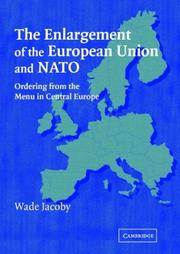| Listing 1 - 3 of 3 |
Sort by
|

ISBN: 0521833590 9780521833592 0521682088 1107160898 0511230893 0511231660 051130868X 0511756224 1280702737 0511229275 0511230117 9780511230110 9780511230899 9780511231667 9780511756221 9781280702730 9781107160897 9780511229275 9780521682084 9780511227578 0511227574 Year: 2004 Publisher: Cambridge, UK New York Cambridge University Press
Abstract | Keywords | Export | Availability | Bookmark
 Loading...
Loading...Choose an application
- Reference Manager
- EndNote
- RefWorks (Direct export to RefWorks)
In 2004 the European Union and NATO each added ten new member states, most from the post-communist countries of Eastern and Central Europe. In order to prepare for membership, these countries had to make many thousands of institutional and legal adjustments. Indeed, they often tried to modernize in just a few years, implementing practices that evolved over many decades in Western Europe. This book emphasizes the way that policy elites in Central and Eastern Europe often 'ordered from the menu' of established Western practices. When did this emulation of Western practices succeed and when did it result in a fiasco? Professor Jacoby examines empirical cases in agriculture, regional policy, consumer protection, health care, civilian control of the military, and military professionalism from Hungary, the Czech Republic, Poland, Bulgaria, and the Ukraine. The book addresses debates in institutionalist theory, including conditionality, Europeanization, and external influences on democratic and market transitions.
Public administration --- Administration publique (Science) --- North Atlantic Treaty Organization --- European Union --- Europe --- Economic integration. --- Intégration économique --- Economic integration --- Intégration économique --- Europe [Central ] --- Europe [Eastern ] --- Union européenne --- North Atlantic Treaty Organization. --- Public administration - Europe, Central --- Public administration - Europe, Eastern --- Europe - Economic integration --- Social Sciences --- Political Science --- Administration, Public --- Delivery of government services --- Government services, Delivery of --- Public management --- Public sector management --- Political science --- Administrative law --- Decentralization in government --- Local government --- Public officers --- North Atlantic treaty organisation --- NAVO --- OTAN --- E.U. --- EASTERN EUROPE -- 341.123 --- CENTRAL EUROPE -- 341.123 --- ECONOMIC INTEGRATION -- 341.123
Book
ISBN: 9782800414553 2800414553 Year: 2009 Volume: *6 Publisher: Bruxelles : Editions de l’Université de Bruxelles,
Abstract | Keywords | Export | Availability | Bookmark
 Loading...
Loading...Choose an application
- Reference Manager
- EndNote
- RefWorks (Direct export to RefWorks)
Pourquoi, à l’instar d’autres pays d’Europe centrale et orientale, la Roumanie s’est-elle rangée du côté des Etats-Unis et a-t-elle soutenu l’invasion américaine en Irak en 2003 ? Comment expliquer l’ambiguïté de son positionnement sur un certain nombre de questions de politique internationale après l’effondrement du communisme ? Pour répondre à ces questions, l’ouvrage retrace l’évolution de la politique étrangère roumaine après 1989 et identifie trois étapes : une première période d’ambiguïté, caractérisée par l’oscillation entre plusieurs options ; une deuxième phase, dominée par la poursuite des objectifs d’adhésion à l’UE et à l’OTAN ; une troisième, marquée par des tentatives de redéfinir le rôle de la Roumanie dans le paysage régional. L’auteur rappelle le contexte historique et culturel où s’inscrivent les choix posés par les décideurs roumains, analyse l’articulation entre la politique interne et la politique étrangère et le rôle des déterminants externes. Elle met en lumière la persistance, après 1989, de la logique binaire spécifique à la guerre froide qui amène la Roumanie à préférer une alliance avec une grande puissance pour assurer sa sécurité.
European Union --- North Atlantic Treaty Organization --- Romania --- Roumanie --- Foreign relations --- Politics and government --- Relations extérieures --- Politique et gouvernement --- --Politique extérieure --- --Romania --- 949.8 --- History Romania --- Relations extérieures --- 1989 --- -Romania --- -European Union --- -Roumanie --- -Politique extérieure --- Romania - Foreign relations - 1989 --- Politique extérieure --- 1989-....
Book
ISBN: 2910846377 2922494314 9782910846374 9782922494310 Year: 2000 Publisher: Marseille Agone
Abstract | Keywords | Export | Availability | Bookmark
 Loading...
Loading...Choose an application
- Reference Manager
- EndNote
- RefWorks (Direct export to RefWorks)
Kosovo War, 1998-1999 --- Guerre du Kosovo, 1998-1999 --- Foreign public opinion --- Participation, Foreign --- Opinion publique étrangère --- Participation étrangère --- North Atlantic Treaty Organization --- Médias --- Aspect politique --- 32.019.5 --- 323.1 <497> --- 327.5 <497> --- Opinion publique étrangère --- Participation étrangère --- Communication et démocratie --- Guerre --- Journalisme de guerre --- Médias - Aspect politique
| Listing 1 - 3 of 3 |
Sort by
|

 Search
Search Feedback
Feedback About UniCat
About UniCat  Help
Help News
News